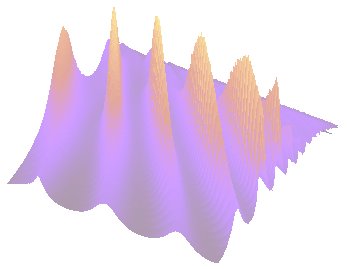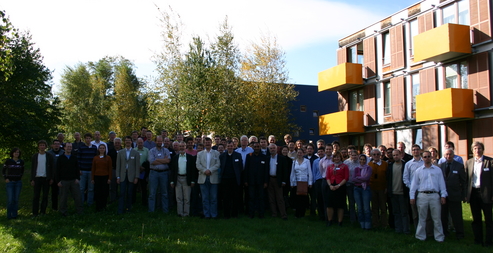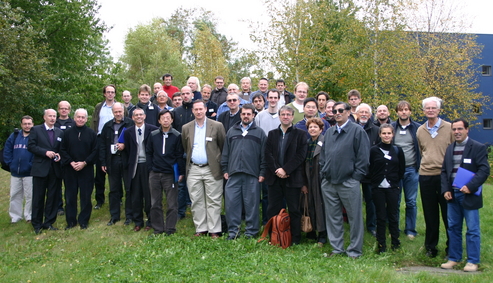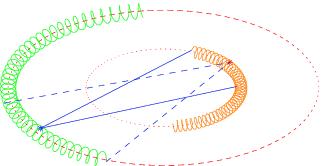Handling editor: Hinke Osinga
| |
| International Workshops on |
| Delayed Complex Systems |
| October 5-9, 2009 |
| Organized by: |
Wolfram Just
Axel Pelster
Michael Schanz
Eckehard Schöll |
State-Dependent Delay Equations |
| October 12-16, 2009 |
| Organized by: |
Jayme De Luca
Antony R. Humphries
John Mallet-Paret |
|
The Max Planck Institute for the Physics of Complex
Systems in Dresden, Germany, hosted two workshops in October with a
focus on delay equations. The workshop on Delayed Complex Systems was
organized by Wolfram Just (Queen Mary Universit of London), Axel
Pelster (Universität Duisburg-Essen), Michael Schanz
(Universität Stuttgart) and Eckehard Schöll (Technische
Universität Berlin) with local support from Renate Seidel and
Sofja Roscina. The workshop on State-Dependent Delay Equations was
held the following week and was organized by Jayme De Luca
(Universidade Federal de São Carlos, Brazil), Tony Humphries
(McGill University, Montreal) and John Mallet-Paret (Brown University,
Providence) with local support from Katrin Lantsch.
 The international
workshop on Delayed Complex Systems addressed
state-of-the-art applications of delay differential equations in
various scientific disciplines. In particular, its aim was to review
the systematic investigations of nonlinear dynamical systems with time
delay for mechanical, electro- and acousto-optical as well as
optically bistable systems and lasers. The meeting also encompassed
applications of time delays in neuroscience, where memory effects are
important, economy, sociology, and
ecology, where the finite propagation time of information must often
be considered. Furthermore, time delays have become an important tool
for controlling nonlinear dynamical systems, as exemplified by new
approaches towards controlling deterministic chaos or noise-induced
oscillations and patterns. Complementary to these applications,
participants presented fundamental developments in novel theoretical
concepts and sophisticated numerical analysis of these
systems. Particularly of interest were new insights in the
mathematical properties of deterministic and stochastic delay
differential equations, including spatially inhomogeneous
systems.
The international
workshop on Delayed Complex Systems addressed
state-of-the-art applications of delay differential equations in
various scientific disciplines. In particular, its aim was to review
the systematic investigations of nonlinear dynamical systems with time
delay for mechanical, electro- and acousto-optical as well as
optically bistable systems and lasers. The meeting also encompassed
applications of time delays in neuroscience, where memory effects are
important, economy, sociology, and
ecology, where the finite propagation time of information must often
be considered. Furthermore, time delays have become an important tool
for controlling nonlinear dynamical systems, as exemplified by new
approaches towards controlling deterministic chaos or noise-induced
oscillations and patterns. Complementary to these applications,
participants presented fundamental developments in novel theoretical
concepts and sophisticated numerical analysis of these
systems. Particularly of interest were new insights in the
mathematical properties of deterministic and stochastic delay
differential equations, including spatially inhomogeneous
systems.
 |
| Group photo of the workshop on
Delayed Complex Systems. |
This first workshop was the larger of the two, with
about 80 participants. It had a clear focus on the physical
sciences aspects of delays, with a healthy contribution from
applied mathematics. Synchronization was a theme throughout, with
applications in biological as well as physical systems. When it comes
to fields of applications, then lasers dynamics was the most
prominent. Personal highlights for me were
presentations that combined several aspect of the meeting. In this
regard I would like to
mention the talks by Raj Roy on sensor networks realized by
simple laser devices with opto-electronic feedback, by Andreas Amann on
time-delayed multi-mode laser networks, and the evening lecture by
Ingo Fischer on lasers coupled via relay elements. The contributed
presentations were also very good and provided an excellent insight
into the types of problems people are currently working on; here recurrent
themes were delayed control schemes and stochastic effects. It was
also great that two participants of the second workshop talked on
state-dependent delay problems in the first week, hence, demonstrating
the cohesion between the two events.
The mention of an evening lecture indicates that the programme was
quite dense. However, there was sufficent time during regular coffee
breaks, during the poster session (helped by German beer and wine) and
— last but not least — the excursion on Wednesday afternoon. The
complex system called the weather showed its friendly side and we were
treated to a lush afternoon (20º Celsius!) in Dresden and in
the summer residence of Pillnitz, which was reached by Elbe boat.
 |
| Group photo of the workshop on State-Dependent Delay Equations. |
 The international
workshop on State-Dependent Delay Equations
addressed the fact that physical and biological applications often
demand the use of non-constant or state-dependent delays, and
realistic models give rise to mixed-type funtional differential
equations with both advanced and retarded arguments (for example,
travelling waves in nonlinear lattices). Neutral mixed-type
implicitly-state-dependent equations fall outside the scope of the
rapidly maturing theory of fixed delay equations treated as dynamical systems
with semi-flows on an infinite-dimensional functional space, and give
rise to challenging problems in both the mathematical analysis of the
equations and the numerical computation and analysis of
solutions. Although progress has been made in recent years on some
model state-dependent problems, in particular monotone problems with
positive or negative feedback, the behavior of more general and
realistic systems remains poorly understood.
The international
workshop on State-Dependent Delay Equations
addressed the fact that physical and biological applications often
demand the use of non-constant or state-dependent delays, and
realistic models give rise to mixed-type funtional differential
equations with both advanced and retarded arguments (for example,
travelling waves in nonlinear lattices). Neutral mixed-type
implicitly-state-dependent equations fall outside the scope of the
rapidly maturing theory of fixed delay equations treated as dynamical systems
with semi-flows on an infinite-dimensional functional space, and give
rise to challenging problems in both the mathematical analysis of the
equations and the numerical computation and analysis of
solutions. Although progress has been made in recent years on some
model state-dependent problems, in particular monotone problems with
positive or negative feedback, the behavior of more general and
realistic systems remains poorly understood.
|
This second workshop was more mathematical in nature, owing to the fact
that even the basic theory of state-dependent delays still raises many
open questions. The exposition of the theory, for example in terms of the
existence of special solutions, was well complimented by contributions
on numerical methods. Furthermore, the organisers did a great job of ensuring
participation from `interested parties' (which included myself)
with quite a number of talks
on where state-dependent and advanced-delayed equations arise in
applications. It was great to see some colleagues that I had not met
for a long time (especially Shui-Nee Chow whom I know from my PhD
time!) but, compared to the first week, I knew far fewer
participants. This was apparently also the case for other
participants, and it shows that the organisers did really
manage to bring different communities together. The breadth of the
workshop was also
reflected in the methods of delivery: the whole range was covered, from
blackboard talks to computer animations. As was
pointed out, this was the first workshop on delay equations
with the word `state-dependent' in the title. And it must be said that
the weather appeared to be in quite a state as well.
The excursion through Dresden on Wednesday afternoon could not
have been more different from the week before: it
started to snow! The local organisers had wisely chosen a programme with
indoor features. The highlight was the demonstration of the famous
Sibermann organ in the Katholische Hofkirche (Catholic Court Church),
whose construction was finished in 1755.
Taken together, the two workshops were an excellent
opportunity to catch up on the latest developments in theory, numerics
and applications of systems with delay.
Bernd Krauskopf
University of Bristol
|
|
 |